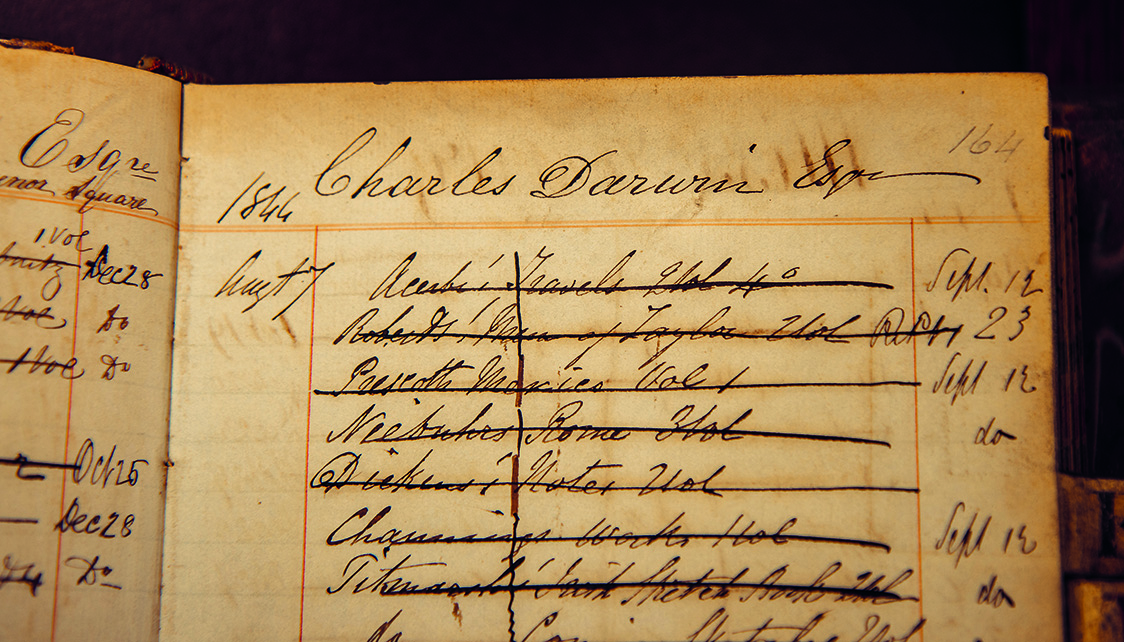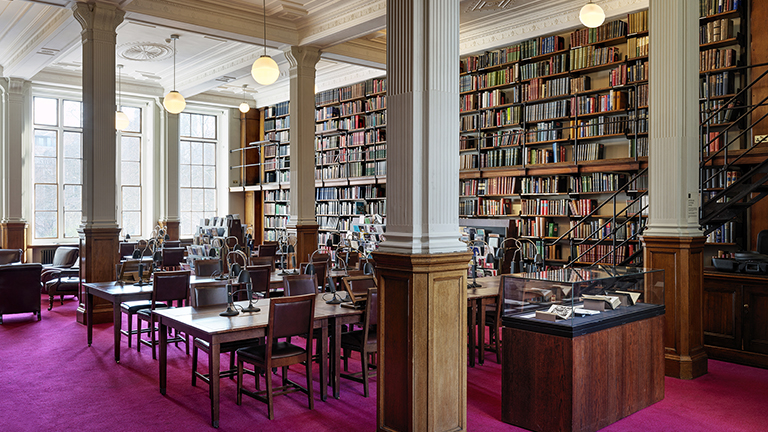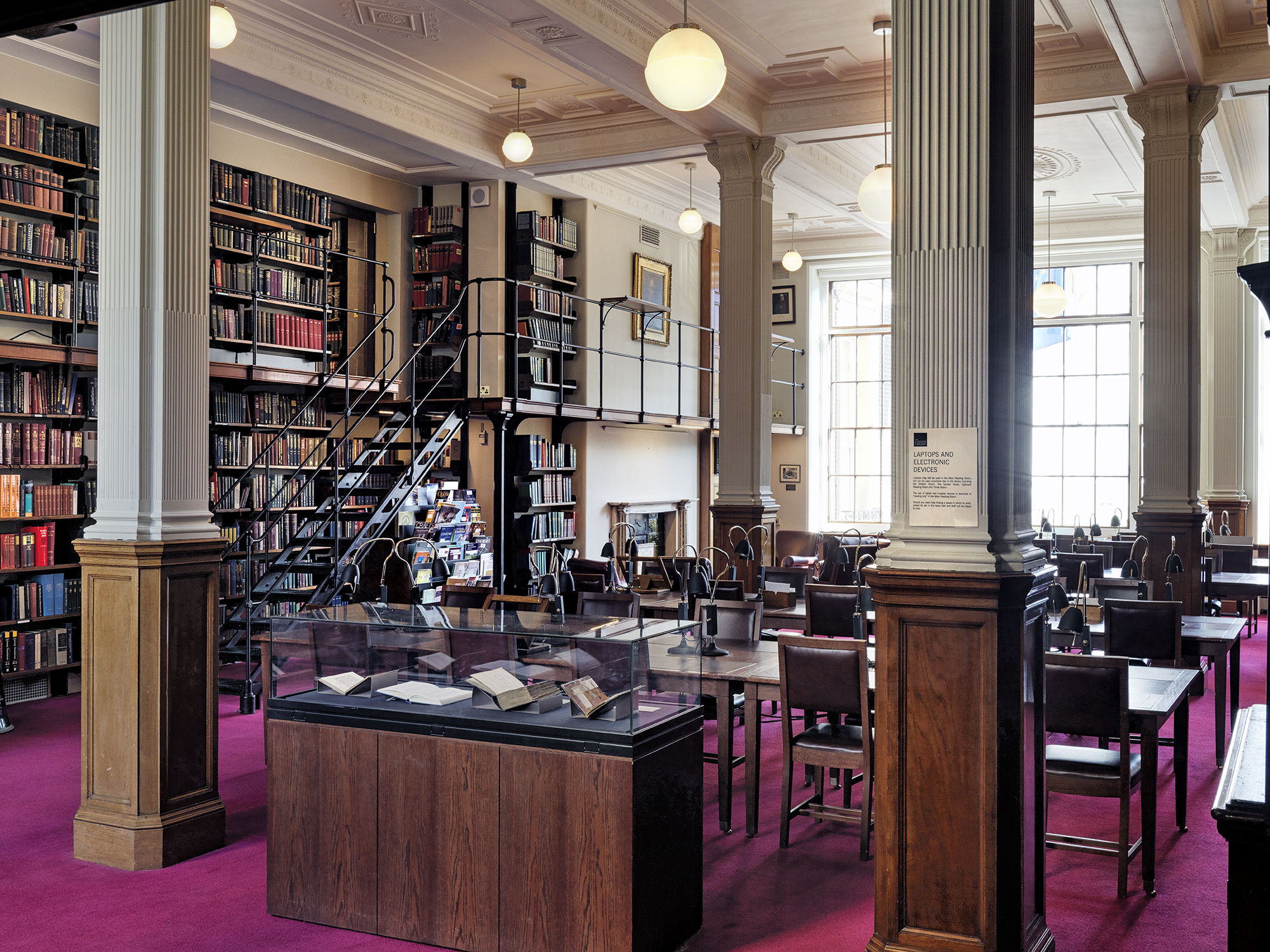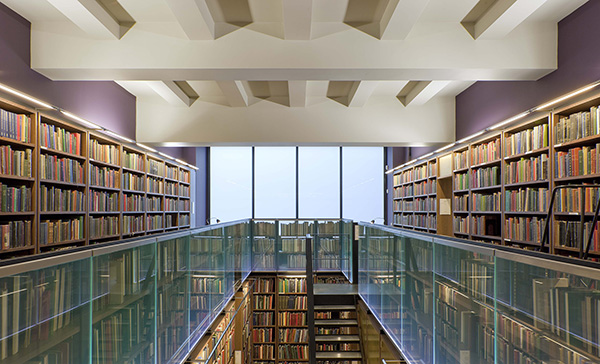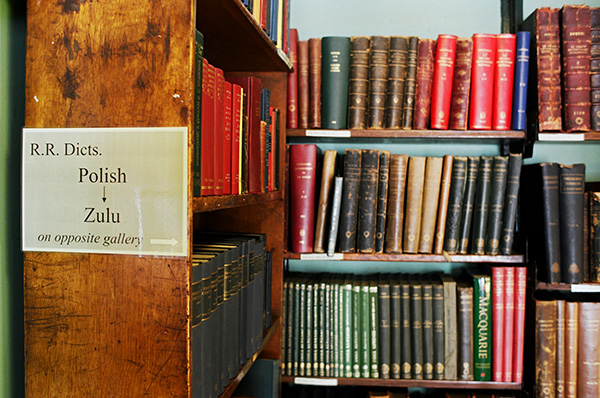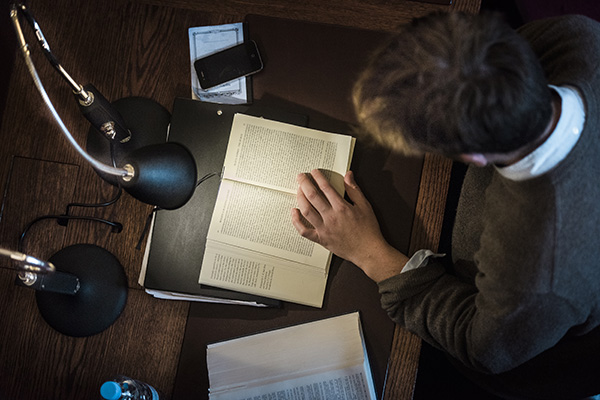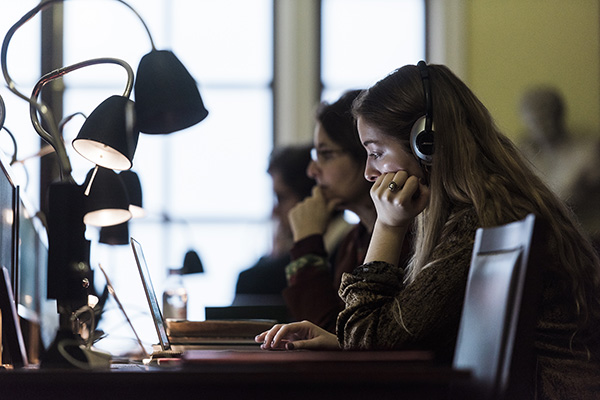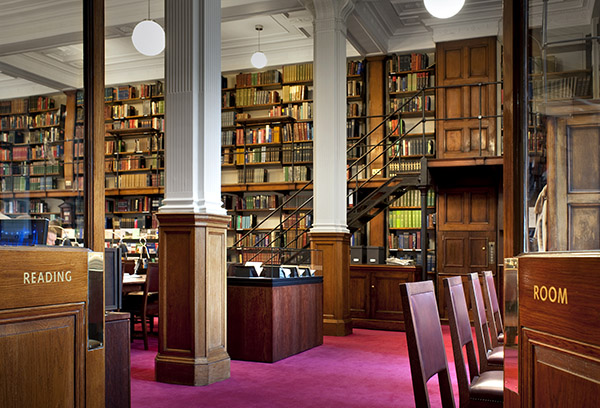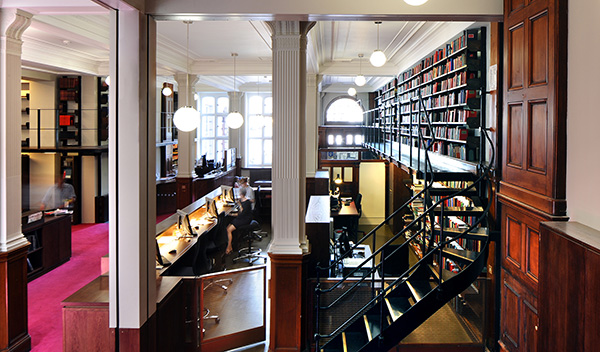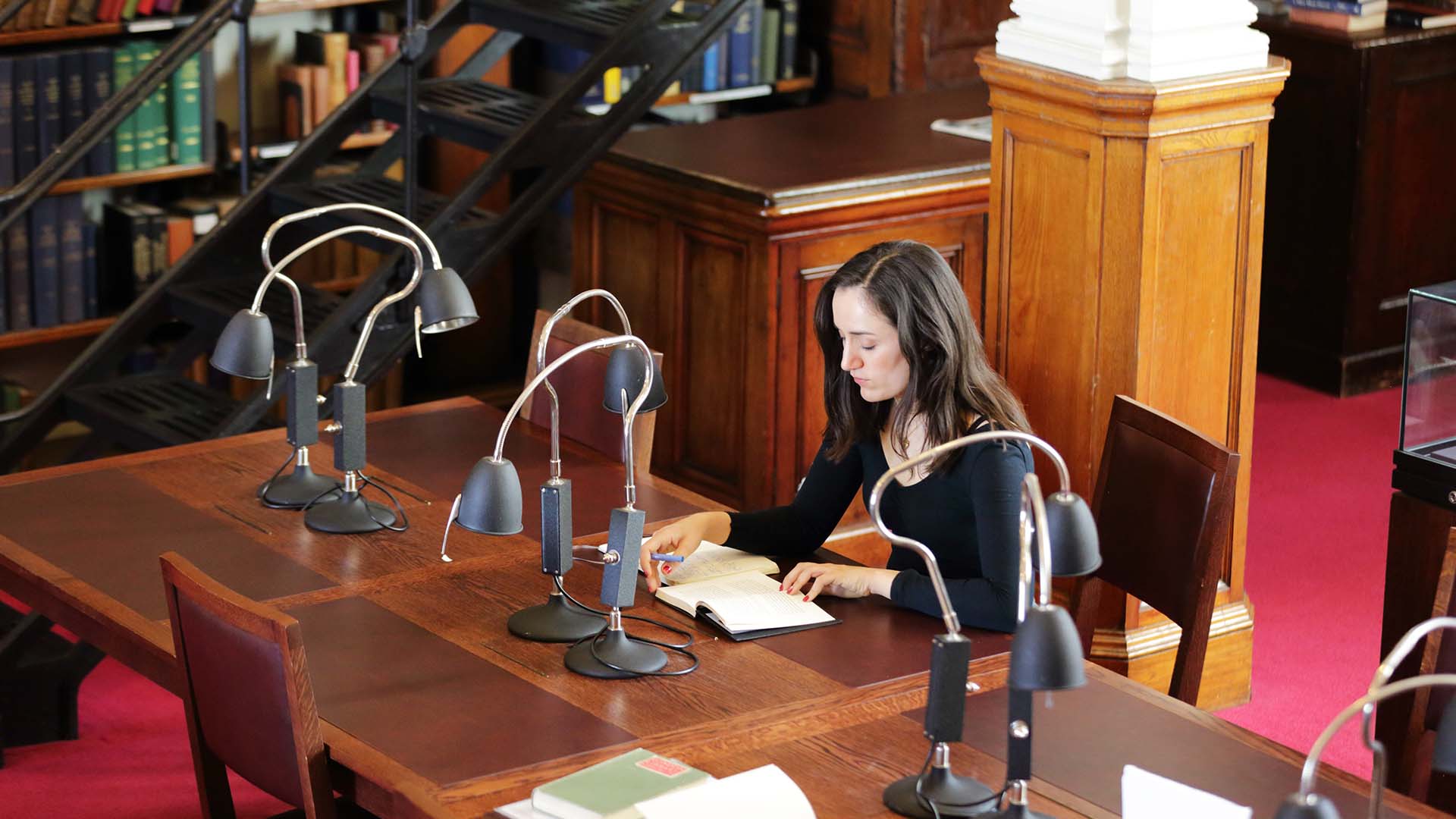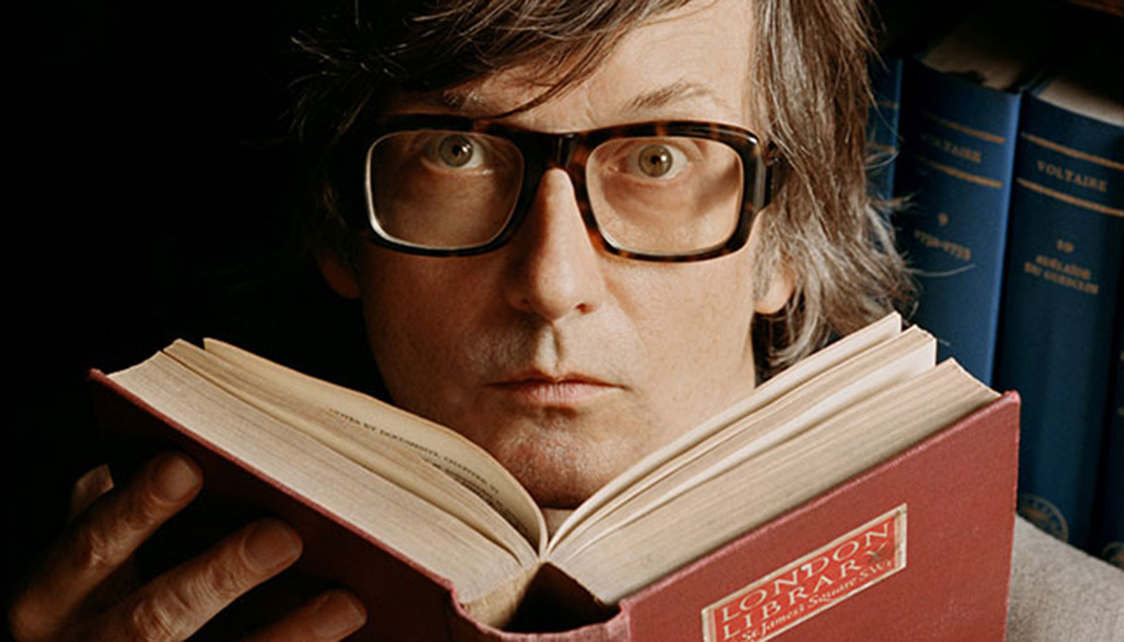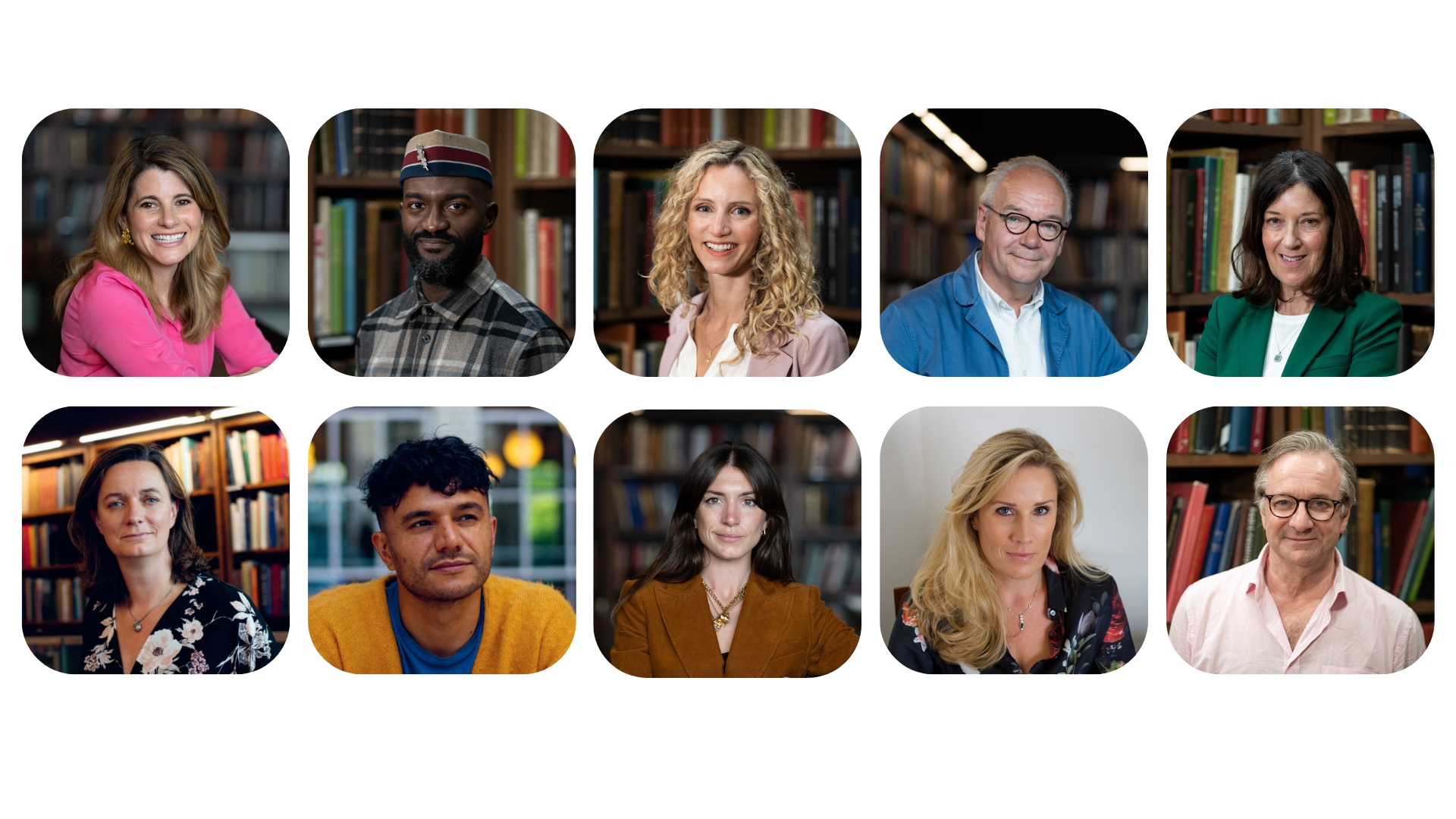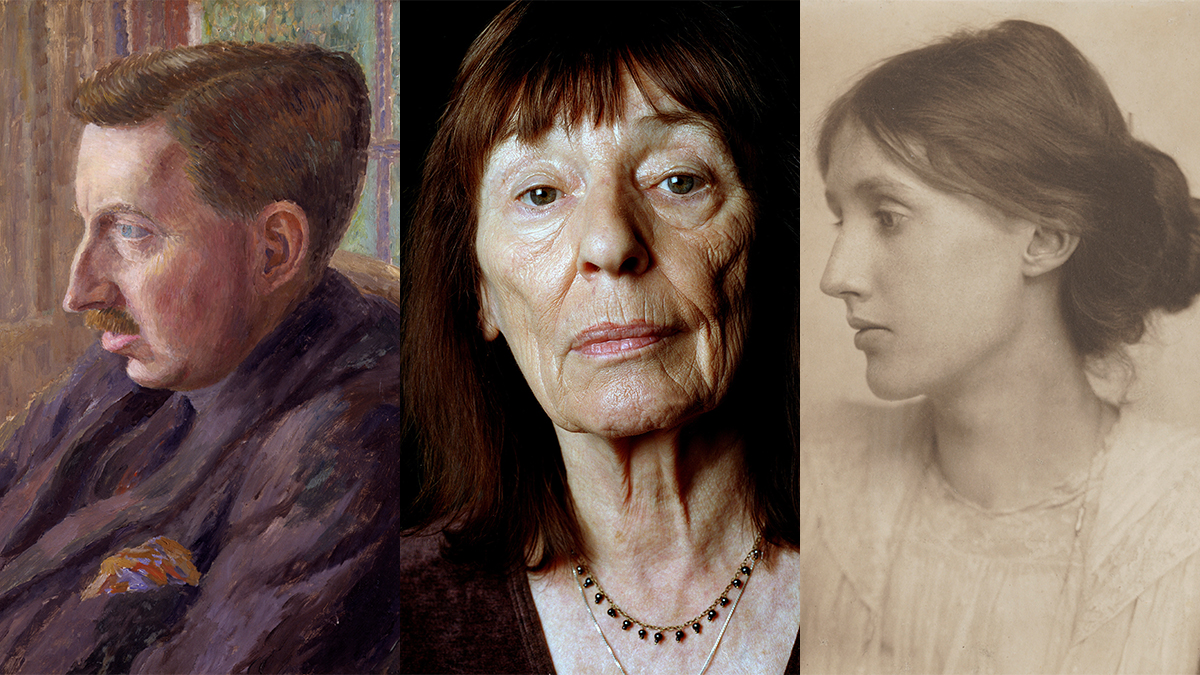
We have recently installed a new display of pictures on the Library’s atmospheric Red Stairs which tells the story of the Library as a unique centre of creativity and inspiration.
Along six flights of stairs - from the Issue Hall up to the entrance of the St James’s Stacks - over 60 framed pictures have been put in place. Included in the display are portraits of over 50 well-known members with interpretation describing their remarkable connections to the Library and the work they produced during their membership.
It is an extraordinary and varied list – from Angela Carter to Charles Dickens, Christabel Pankhurst to Stanley Kubrick, Alec Guinness to Daphne du Maurier.
The exhibition shows how a remarkable number of members joined at an early stage in their careers and the Library provided a thread through much of their writing lives. Virginia Woolf joined 11 years before writing her first novel; Ian Fleming’s entire output on James Bond was written as a Library member; TS Eliot’s early writing career depended on access to the Library’s collection.
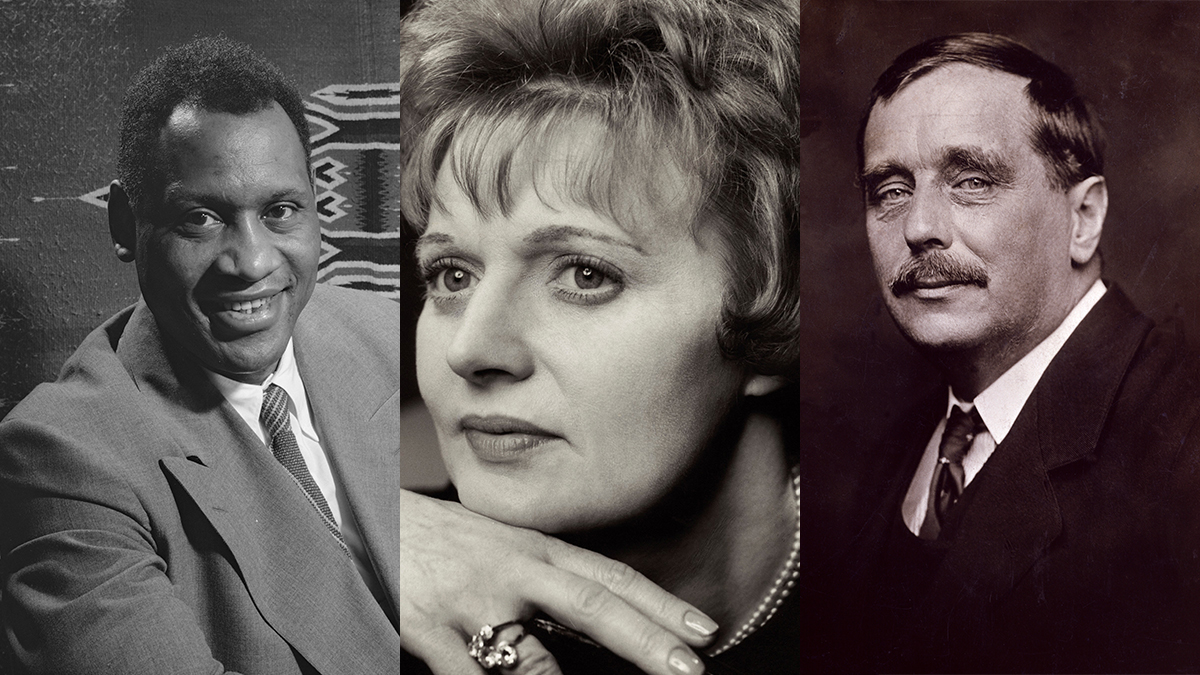
Personal connections are revealed – EM Forster donated the manuscript of The Passage to India to save the Library he loved; George Bernard Shaw applied for life membership only hours after the death of his wife, Charlotte Payne-Townshend (a member for 45 years); sisters Vanessa Bell and Virginia Woolf celebrated their father becoming Library President in their childhood diaries; Diana Rigg joked about her age on her membership form.
Alongside the Library’s connections with well-known members, the exhibition profiles some of the world-famous books – such as Dracula and Possession - that have been inspired by the Library and its collection.
We also take a look at the Library’s vibrant and varied events programme – which is open to anyone; the important work we do to support writers; the personalities featuring in The London Library magazine; and the role the Library plays as a location for filming and media work – from Killing Eve to the Netflix comedy Death to 2020.
We hope that anyone visiting the Library – whether longstanding members or first-time visitors – will enjoy finding out more about the remarkable community that is connected in so many diverse ways to this remarkable place.
--
EM Forster by Dora Carrington ©National Portrait Gallery
Beryl Bainbridge by Eamonn McCabe ©Eamonn McCabe
Virginia Woolf by George Charles Beresford, ©National Portrait Gallery
Paul Robeson, anon c1942
Muriel Spark by Mark Gerson ©Mark Gerson/National Portrait Gallery
HG Wells by George Charles Beresford ©National Portrait Gallery
As The London Library prepares to celebrate its 180th anniversary this weekend, it reveals for the first time the extensive borrowing records of Charles Darwin, who was one of the Library’s earliest members, joining within a few weeks of the Library opening on 3rd May 1841.
In the Library’s archive are a selection of handwritten Issue Books from the 1840s and 1850s, only a few of which have survived to provide a partial record of early members’ borrowing activities. In amongst them are records for Charles Darwin, listing the books he borrowed during various periods between July 1843 and February 1846 and then during a short, undated period in the early 1850s. The Library’s recent research into these ledgers provides a remarkable insight into Charles Darwin’s reading habits during a busy period in his professional life and reveal him to be a voracious leisure reader.
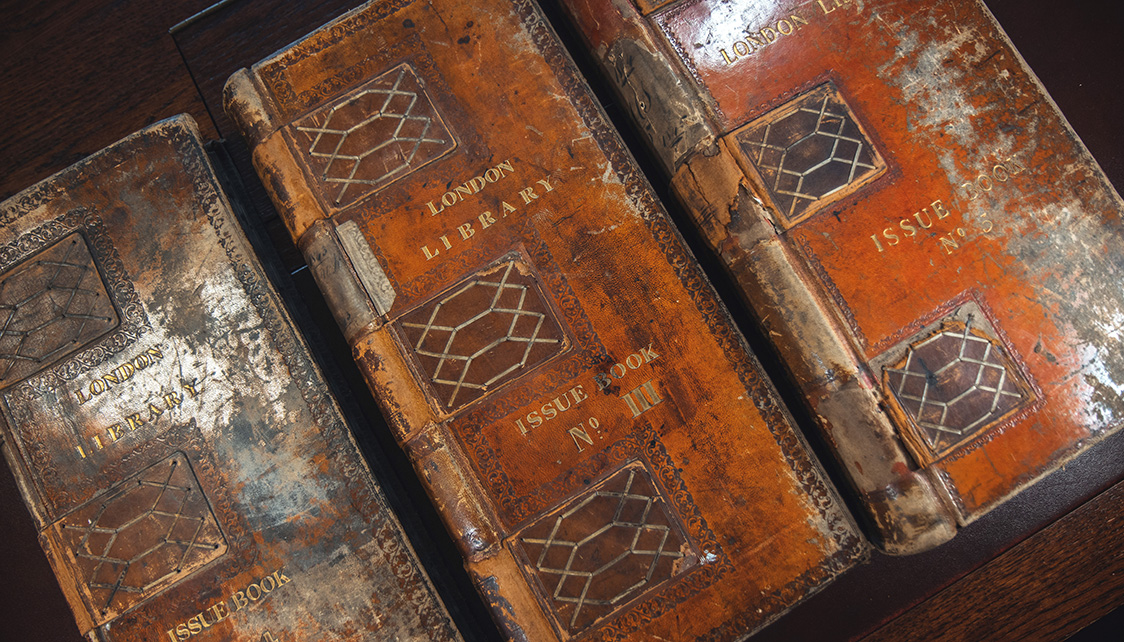
© Cultureshock
In the two year period between July 1843 and July 1845, for example, the Issue Books reveal that Charles Darwin borrowed at least 200 books from The London Library, arranging 36 separate visits to collect them. Of the 119 titles mentioned – many of them multi-volume works - the Library has at least 73 of the relevant editions still in its collection today.
The list is remarkable in its range and extent. Charles Darwin’s reading list includes:
- Lives of the Queens of England, by Agnes Strickland
- Travels in New Zealand by Ernst Dieffenbach
- Works and Essays by Montaigne
- Consuelo, Andre and Valentine by George Sand
- Austria by JB Kohl
- The Journal of a Naturalist by John Knapp
- Correspondence of William Pitt
- The History of Greece by William Mitford
- Sermons on Christian Life by Thomas Arnold
- History of the Conquest of Mexico by William Prescott
- Travels through the Alps by James Forbes
- The Bible in Spain by George Henry Borrow
- The Poetical Works of Robert Southey
- The Art of Deer Stalking by William Scrope
The period covered by the Issue Books were a hectic time for the family. Five children were born and during the 1840s Charles Darwin, often ill, produced scientific works on coral reefs and volcanic islands and a revised edition of his bestselling Voyage of the Beagle. Out of the public eye, he was also working on his ‘species theory’, outlining the main ideas in his notebooks by 1842 and writing them up as a fully researched paper which he began sharing with his closest friends in 1844, 15 years before they were eventually published as The Origin of the Species. Exhaustive research into barnacles dominated his time in the late 1840s.
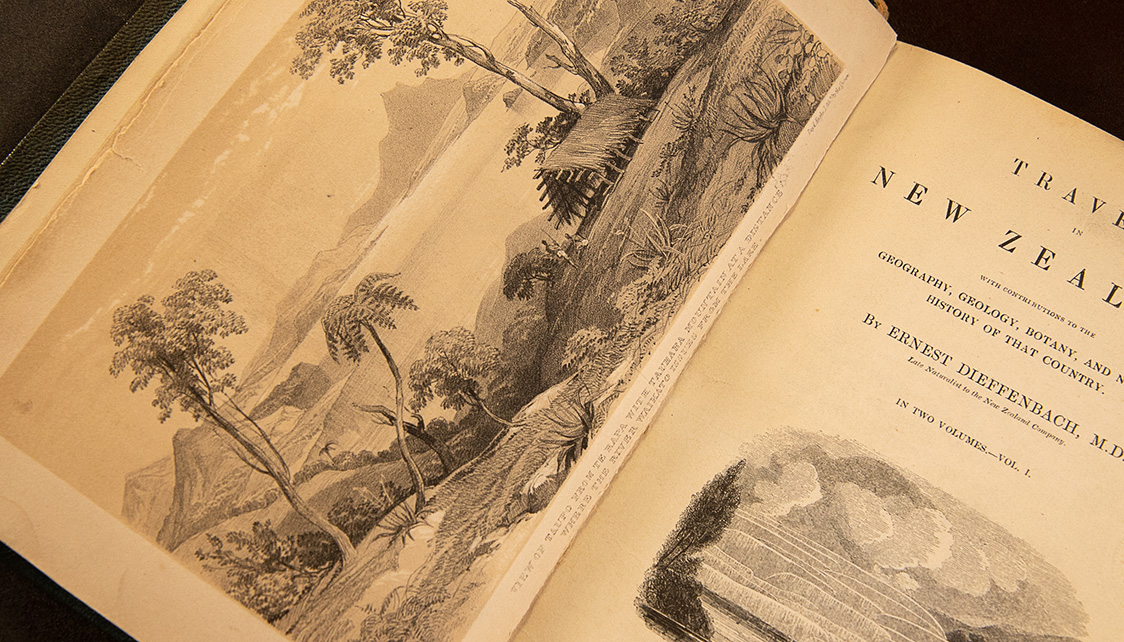
© Cultureshock
In spite of the workload, Charles Darwin and his wife Emma would often spend evenings reading together. It is highly likely that London Library books formed part of this routine, with Charles often borrowing books two or three times a month, taking out several volumes at a time.
Philip Marshall, Director of The London Library commented: “The Issue Books are a remarkable survival, and reveal a fascinating portrait of Charles Darwin as a voracious general reader fuelled by intellectual curiosity and drawing heavily on The London Library for reading material. As the Library approaches its 180th anniversary it has been very special to explore the way in which the Library’s collection informed the thinking of one of its earliest members just as it drives the ideas of our members today.”
The Library’s connection with the Darwin family is a strong one. Charles Darwin’s brother Erasmus was a founder member and introduced Charles to the Library in 1841. Five of Charles’ children joined between 1862 and 1890. Writer, Emma Darwin – Charles’s great-great granddaughter – has been a member here for several years.
The research into Charles Darwin’s reading list demonstrates the place The London Library has as one of the country’s greatest literary institutions, providing a centre of creativity, inspiration and ideas for 180 years. It has had a unique impact on the country’s literary and artistic output and continues to do so today. Thousands of the world’s greatest writers and thinkers have been associated with it, passionately supporting it and drawing heavily on its collection to produce their work. The London Library is the world’s largest independent lending library and anyone can become a member.
Read more: Charles Darwin’s reading list revealed at The London Library
Behind an elegant facade overlooking St. James's Square is a vast network of books, where since the mid-nineteenth century, seven buildings have been brought into one and a great centre of learning and ideas has been created. Now you can look inside The London Library without visiting St James's Square as we are excited to announce the release of a 3D tour of our building.
The tour showcases our main reading and writing spaces, including the beautiful Reading Room, the Writers' Room, Lightwell, Times Room and more. You'll also be able to discover some of our more hidden desks, nestled among the book shelves. From the tour you can explore numerous areas of our collection including our Art Room, Literature, the famous grilled Back Stacks housing our History, Topography, science & Miscellanous collections and others to really get a feel for what it's like inside our labyrinthine building.
We hope the tour will be of use to anyone new to the Library or considering becoming a member, providing an easy way for them to find their way around the building and discover more about what’s inside this special place.
Thank you to everyone who joined us over the weekend 1-3 May - individual event tickets or a festival pass can still be purchased to watch the recorded events in your own time up to 13 June.
--
It’s our birthday! Join us to celebrate 180 glorious years of The London Library with The London Library Lit Fest.
We’re bringing together some of the brightest stars in the literary firmament for an eclectic and thought-provoking Bank Holiday weekend of online talks, workshops and performances, exploring libraries and The London Library in particular, as open places of community, discovery and refuge; where every book and every voice has a place; where ideas and creativity can form and grow.
Salman Rushdie joins us to mark 40 years since the publication of Midnight’s Children - he’ll discuss the inspiration and genesis of that book, his extraordinary body of work since, freedom of expression and the role The London Library and English PEN have played in his writing life.
Other talks with leading writers will include Sarah Waters in conversation with Hallie Rubenhold; Simon Schama discussing friendships and rivalries in art and literature; Polly Samson on her latest novel A Theatre for Dreamers and artistic communities chaired by Edward Docx; and Edmund de Waal will be in conversation with Tom Stoppard.
Discussion and panel events include Philippe Sands, Daria Santini and George Prochnik discussing Stefan Zweig in London, with readings from Zweig’s letters in partnership with Insiders Outsiders. Suzannah Lipscomb, David Nicholls, Naomi Ishiguro and Yassmin Abdel-Magied will take part in a 5x15 event. In partnership with Brighton Festival, Monique Roffey and C Pam Zhang will be discussing myth and discovery.
Bidisha will chair a discussion about publishers and publishing projects rediscovering and republishing classics by marginalised writers with Penguin’s Hannah Chukwu and Virago founder Lennie Goodings. For poetry lovers, Malika's Poetry Kitchen will host a poetry party to include performances by Inua Ellams, Kayo Chingonyi, Arji Manuelpillai, Malika Booker and Zakia Carpenter-Hall. Rebecca West was Vice President of The London Library and a founder of English PEN and played an important role in the development of both organisations; she will be remembered in a unique celebration event.
A series of workshops and interactive events will include a performance of a dramatic adaptation of A Room of One's Own by Linda Marshall-Griffiths and directed by Charlotte Westenra; creative writing workshops in partnership with Arvon; a workshop on Gender Swapped Fairytales with Karrie Fransmann and Jonathan Plackett; and a showcase of writers from The London Library’s Emerging Writers Programme in an event compered by John O’Farrell.
Tickets for most events cost £5 or you can buy a Festival Pass at the very reasonable price of £25 for all the weekend’s events.

